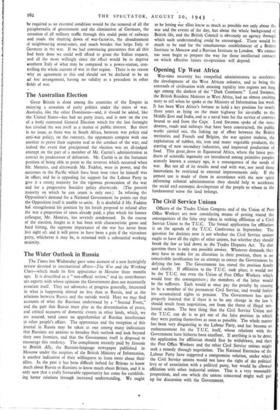The Wider Outlook in Russia
The Times last Wednesday gave some account of a new fortnightly review devoted to international affairs—The War and the Working Class—which made its first appearance in Moscow three months ago. It is described as a " non-official review," and its contributors are experts with whose opinions the Government does not necessarily associate itself. They are advocates of progress generally, interested in what is happening abroad no less than in Russia, and in the relations between Russia and the outside world. Here we may find accounts of what the Russians understand by a " Second Front," and the part that Russia must play in the determination of peace, and critical accounts of domestic events in other lands, which, we are assured, need cause no apprehension of Russian interference in other people's affairs. The appearance and the reception of this journal in Russia may be taken as one among many indications that Russians are anxious to broaden their outlook and look beyond their own frontiers, and that the Government itself is disposed to encourage this tendency. The compliment recently paid by Izvestia to British Ally, the Russian-language newspaper published in Moscow under the auspices of the British Ministry of Information, is another indication of their willingness to learn more about their allies. In the past it has been difficult indeed for Britons to know much about Russia or Russians to know much about Britain, and it is only now that a really favourable opportunity has come for establish- ing better relations through increased understanding. We ought
to be letting Our allies kncw as much as possible not only about the war and the events of the day, but about the whole background of British life, and the British Council is obviously an agency through which such understanding could be encouraged. There would . be much to be said for the .simultaneous. establishment of a British Institute in Moscow and a Russian Institute in London. We cannot too soon begin to prepare the way for those intellectual contacts on which effective future co-operation will depend.


























 Previous page
Previous page